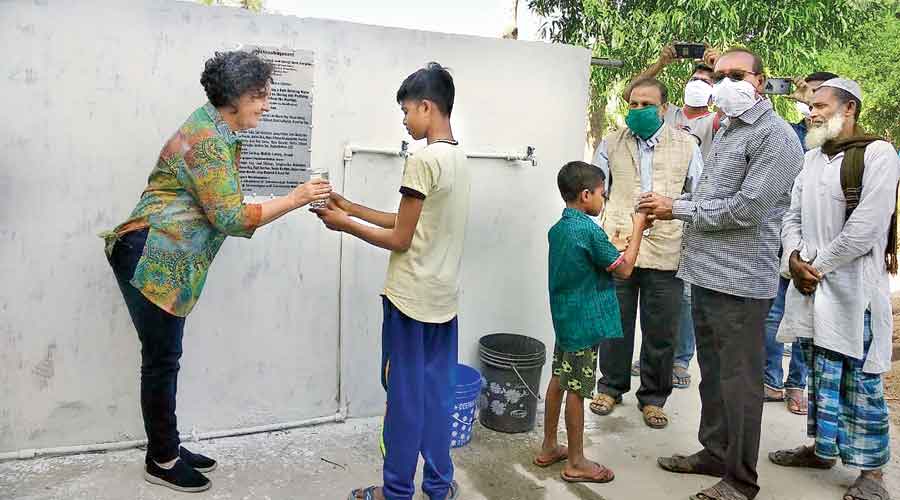An NGO on Saturday inaugurated a system in a Sunderbans village that will purify rainwater and make it fit for residents to drink.
Safe drinking water is a major problem in the area, where most people rely on groundwater. Tests conducted by the NGO Mallarpur Uthnau have revealed that even groundwater is not safe.
“The WHO limit for arsenic in water is 0.05mg/l, but here at Samsernagar the level (in ground water) is 3.45mg/l. WHO permits no more than 0.003mg/l of cadmium in water, but again here it is an alarming 2.8mg/l,” said Kunal Deb, the secretary of the NGO that has been working on environmental and livelihood issues since 1996.
“The water has extreme levels of lead, mercury, cyanide, EColi and other bacteria. These can lead to cancers, metabolic and neurological problems in the residents.”
The handful who can afford water purifiers are better off but even their machines are useless most of the day because of power-cuts. Samsernagar, for instance, had been without power for a month since Cyclone Amphan had struck on May 20.
And when calamity strikes, even this poisonous groundwater is out of bounds as the tubewells get submerged.
However, the Sunderbans receive 1,600mm of rainwater per annum. The NGO will harvest the rainwater on the terrace of a building. “Rainwater cannot directly be consumed because of pollution in the air,” said Deb.
The project is built on the terrace of a concrete building in the neighbourhood — Samsernagar Swamiji Netaji Seva Sangha — where children come for coaching and adults for vocational training. About 1,000sq foot of the terrace has been taken for the project and it can provide 80,000 to 1 lakh litres of potable water a year.
Water from the terrace drains into a 20,000 litre storage tank. A pump (that runs on kerosene) pushes this water into different layers of purification — charcoal, sand, gravel etc — and healthy levels of minerals are added to the water at this stage.
The water then collects in a supply tank. When someone turns on the tap for a glass of water, the liquid undergoes one final stage of cleansing through an ultra-filtration membrane.
The project cost was Rs 2.5 lakh, which has been raised through crowdfunding. One such donor is Jael Silliman, a Calcutta-based Jew, who mobilised her friends and family in Israel and the US to pool in.
“In these times of Covid, people want to support one another, especially if they see the difference it is making. I visited the site for the first time today for the inauguration but have been forwarding them pictures of the development all this while and they are delighted,” said Silliman.
The inauguration was done by Jahir and Jakir Gaji, whose father recently got killed in a tiger attack.










